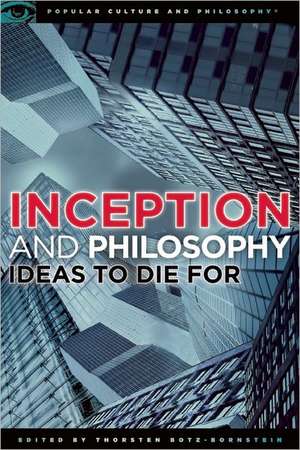Inception and Philosophy: Ideas to Die for: Popular Culture & Philosophy, cartea 62
Editat de Thorsten Botz-Bornsteinen Limba Engleză Paperback – 30 noi 2011
Din seria Popular Culture & Philosophy
-
 Preț: 103.78 lei
Preț: 103.78 lei -
 Preț: 159.62 lei
Preț: 159.62 lei -
 Preț: 159.62 lei
Preț: 159.62 lei -
 Preț: 181.89 lei
Preț: 181.89 lei -
 Preț: 187.62 lei
Preț: 187.62 lei -
 Preț: 191.57 lei
Preț: 191.57 lei -
 Preț: 113.19 lei
Preț: 113.19 lei -
 Preț: 113.60 lei
Preț: 113.60 lei -
 Preț: 211.14 lei
Preț: 211.14 lei -
 Preț: 164.76 lei
Preț: 164.76 lei -
 Preț: 199.93 lei
Preț: 199.93 lei -
![Woody Allen and Philosophy: [You Mean My Whole Fallacy Is Wrong?]](https://i3.books-express.ro/bs/9780812694536/woody-allen-and-philosophy.jpg) Preț: 102.88 lei
Preț: 102.88 lei -
 Preț: 142.30 lei
Preț: 142.30 lei -
 Preț: 104.33 lei
Preț: 104.33 lei -
 Preț: 156.53 lei
Preț: 156.53 lei -
 Preț: 182.56 lei
Preț: 182.56 lei - 20%
 Preț: 168.08 lei
Preț: 168.08 lei -
 Preț: 142.47 lei
Preț: 142.47 lei -
 Preț: 211.84 lei
Preț: 211.84 lei -
 Preț: 111.14 lei
Preț: 111.14 lei -
 Preț: 133.22 lei
Preț: 133.22 lei -
 Preț: 132.57 lei
Preț: 132.57 lei -
 Preț: 135.01 lei
Preț: 135.01 lei -
 Preț: 159.62 lei
Preț: 159.62 lei -
 Preț: 149.67 lei
Preț: 149.67 lei -
 Preț: 197.51 lei
Preț: 197.51 lei -
 Preț: 143.52 lei
Preț: 143.52 lei -
 Preț: 98.95 lei
Preț: 98.95 lei -
 Preț: 155.41 lei
Preț: 155.41 lei -
 Preț: 143.29 lei
Preț: 143.29 lei -
 Preț: 137.96 lei
Preț: 137.96 lei -
 Preț: 143.70 lei
Preț: 143.70 lei -
 Preț: 103.51 lei
Preț: 103.51 lei -
 Preț: 105.15 lei
Preț: 105.15 lei -
 Preț: 103.10 lei
Preț: 103.10 lei -
 Preț: 149.26 lei
Preț: 149.26 lei -
 Preț: 182.76 lei
Preț: 182.76 lei -
 Preț: 159.62 lei
Preț: 159.62 lei -
 Preț: 109.26 lei
Preț: 109.26 lei -
 Preț: 261.29 lei
Preț: 261.29 lei -
 Preț: 181.89 lei
Preț: 181.89 lei -
 Preț: 122.40 lei
Preț: 122.40 lei -
 Preț: 211.14 lei
Preț: 211.14 lei -
 Preț: 181.45 lei
Preț: 181.45 lei -
 Preț: 199.93 lei
Preț: 199.93 lei -
 Preț: 142.30 lei
Preț: 142.30 lei -
 Preț: 159.62 lei
Preț: 159.62 lei -
 Preț: 132.81 lei
Preț: 132.81 lei -
 Preț: 115.05 lei
Preț: 115.05 lei -
 Preț: 158.58 lei
Preț: 158.58 lei
Preț: 198.71 lei
Nou
Puncte Express: 298
Preț estimativ în valută:
38.03€ • 39.56$ • 31.39£
38.03€ • 39.56$ • 31.39£
Carte disponibilă
Livrare economică 24 martie-07 aprilie
Livrare express 08-14 martie pentru 85.70 lei
Preluare comenzi: 021 569.72.76
Specificații
ISBN-13: 9780812697339
ISBN-10: 0812697332
Pagini: 319
Dimensiuni: 152 x 228 x 23 mm
Greutate: 0.45 kg
Editura: Open Court Publishing Company
Seria Popular Culture & Philosophy
ISBN-10: 0812697332
Pagini: 319
Dimensiuni: 152 x 228 x 23 mm
Greutate: 0.45 kg
Editura: Open Court Publishing Company
Seria Popular Culture & Philosophy
Cuprins
CONTENTS
Who’s Putting Ideas in Your Head?
Level 1 | Come Back to Reality, Please
1. How to Keep Track of Reality
SYLVIA WENMACKERS
2. The Mad Neuroscience of Inception
BERIT BROGAARD
3. Inception and Deception
NATHAN ANDERSEN
4. Plugging in to the Experience Machine
MICHAEL RENNETT
Level 2 | We’re Not in Your Dream
5. You Have No Idea
JANET TESTERMAN
6. The Business of Inception
DANIEL P. MALLOY
7. Mental Burglary
MARCUS SCHULZKE
8. Right and Wrong in Dreams
JOSEPH GARVIN
Level 3 | The Infinite Staircase
9. Ariadne’s Clue to Life, the Universe, and Everything
THOMAS KAPPER
10. Once Upon a Time
RANDALL E. AUXIER
11. The Story of Reality
EMILIE DIONNE
12. Butterfly and Spinning Top
HIU M. CHAN
Level 4 | The Most Resilient Parasite
13. Dream Bigger, Darling
JOSHUA RICHARDSON AND ORA MCWILLIAMS
14. Shared Dreams in Virtual Worlds
MATTHEW BROPHY
15. The Movie as a Thinking Machine
THORSTEN BOTZ-BORNSTEIN
16. Where Time Stands Still
INDALECIO GARCIA
Level 5 | Downwards Is the Only Way Forwards
17. Dreams, Mourning, and Desire
NICOLAS FLOURY
18. The Undiscovered Country Called Experience
JASON J. HOWARD
19. Inception’s Faith in Everyday Life
CHRISTOPHE D. RINGER
20. Building and Dwelling in Inception
VALENTIN HUSSON
21. Dream Time
RANDALL E. AUXIER
Some of Our Totems (Bibliography)
Just Projections of Someone’s Subconscious (Author bios)
Architectural Code (Index)
Who’s Putting Ideas in Your Head?
Level 1 | Come Back to Reality, Please
1. How to Keep Track of Reality
SYLVIA WENMACKERS
2. The Mad Neuroscience of Inception
BERIT BROGAARD
3. Inception and Deception
NATHAN ANDERSEN
4. Plugging in to the Experience Machine
MICHAEL RENNETT
Level 2 | We’re Not in Your Dream
5. You Have No Idea
JANET TESTERMAN
6. The Business of Inception
DANIEL P. MALLOY
7. Mental Burglary
MARCUS SCHULZKE
8. Right and Wrong in Dreams
JOSEPH GARVIN
Level 3 | The Infinite Staircase
9. Ariadne’s Clue to Life, the Universe, and Everything
THOMAS KAPPER
10. Once Upon a Time
RANDALL E. AUXIER
11. The Story of Reality
EMILIE DIONNE
12. Butterfly and Spinning Top
HIU M. CHAN
Level 4 | The Most Resilient Parasite
13. Dream Bigger, Darling
JOSHUA RICHARDSON AND ORA MCWILLIAMS
14. Shared Dreams in Virtual Worlds
MATTHEW BROPHY
15. The Movie as a Thinking Machine
THORSTEN BOTZ-BORNSTEIN
16. Where Time Stands Still
INDALECIO GARCIA
Level 5 | Downwards Is the Only Way Forwards
17. Dreams, Mourning, and Desire
NICOLAS FLOURY
18. The Undiscovered Country Called Experience
JASON J. HOWARD
19. Inception’s Faith in Everyday Life
CHRISTOPHE D. RINGER
20. Building and Dwelling in Inception
VALENTIN HUSSON
21. Dream Time
RANDALL E. AUXIER
Some of Our Totems (Bibliography)
Just Projections of Someone’s Subconscious (Author bios)
Architectural Code (Index)
Recenzii
“The authors of Inception and Philosophy: Ideas to Die For will take you downwards and forwards. They’ll plant seeds that grow in your mind. When you come out of it on the other side, you'll find that many things you think you believe never really made sense, and you’ll wonder why you ever thought they did. Pick it up, start reading, wait for the kick.”
—D.E. Wittkower, Assistant Professor of Philosophy, Old Dominion University
“Inception is one of the most philosophically compelling movies to come out in the past twenty years or more. Reading Inception and Philosophy: Ideas to Die For is like waking from a dream. It could be just that.”
—Richard Greene, co-editor of Dexter and Philosophy
“Not since The Matrix has there been a movie so philosophically rich as Christopher Nolan’s Inception. If I had Dom Cobb’s powers, I would plant just one simple idea—resilient, highly contagious—in the minds of bookstore browsers everywhere: Read Inception and Philosophy: Ideas to Die For.”
—Amy Kind, Associate Professor of Philosophy, Claremont McKenna College
“Nothing can kick-start excited conversations on the gnarly nature of the mind quite like the movie Inception and a bunch of passionate philosophers.”
—Luke Dick, writer, artist, singer, philosophy professor
Extras
THORSTEN BOTZ-BORNSTEIN is Assistant Professor of Philosophy at the Gulf University for Science and Technology in Kuwait and author of Films and Dreams (2008).
Introduction: Who’s Putting Ideas in Your Head?
Two and a half thousand years ago Plato asked: How exactly can we explain our perceptions of reality? The top has been spinning ever since.
Dreams are the original virtual reality. For thousands of years dreams have been ransacked for hidden memories, messages, desires, fears, and secrets.
Dreams are generally weird and sometimes seem absurd, but they don’t usually feel weird when we’re in them. When we wake up from a dream, we’re surprised to find that in the dream we accepted as real many things we now automatically reject as preposterous. But maybe we’re now accepting other things we would find equally preposterous if we could wake up from what we call waking life.
Dreams are often tremendously intricate and detailed. If the world of the dream isn’t real, who made it up? We know that we most certainly didn’t. So where does this world come from? Although strange things can happen in a dream, not anything can happen. We have only limited control over what goes on in our dreams. They have strict laws of their own. Dreams possess a deadly, implacable logic, which may sometimes frustrate or terrify us.
Many viewers enjoy Inception as a story while telling themselves that nothing like this thrilling tale could happen in real life. But (as Chapters 1 and 2 of this book explain) modern neuroscience and philosophy of mind have been showing that most of what occurs in Inception could become hard reality very soon. We almost have the technology to perform inception by way of shared dreams.
To watch Inception is to get into endless discussions about what’s really going on in the movie. Various theories are kicked around in this book. At one extreme, there’s the theory that the entire movie is just a single dream: Cobb’s dream on the long airline flight. This theory appeals to psychoanalysts and takes care of a lot of troublesome problems with the story: it’s expounded by Nicolas Floury in Chapter 17. We guarantee that once you’ve read Nicolas’s chapter, you’ll never again be able to watch Inception without finding one confirmation after another of the single-dream theory.
A very different—but equally ingenious and equally haunting—interpretation is given by Randall Auxier in Chapter 21. Randy proposes a theory that explains most of the difficult or apparently inconsistent points in the story, but which many fans of the movie will find quite startling.
Matthew Brophy takes a different tack in Chapter 14, arguing that the dreams in which Cobb and his team navigate are actually electronic dreams. They don’t exist in the individuals’ brains but on a server. This is why, for Cobb, Mal has become Mal-ware. Technology has made shared dreaming possible: computer users regularly jack in and populate worlds created by programming architects. Forty-three percent of residents of virtual worlds such as Second Life report that they feel at least as strongly about their virtual community as they feel about the real world. Are they walking away from the real world just as Dom Cobb did? Or are they simply walking from one reality to another? For some people, one reality just isn’t enough.
Three and a half centuries ago, René Descartes pointed out that, logically, we can never be sure we’re not dreaming. Yet while Descartes called into question the reality of our experience, he did not doubt that our thoughts are our own. This claim is contested in Inception. And strangely enough, recent findings in neuroscience apparently show that our thoughts cannot possibly be our own (as Janet Testerman explains in Chapter 5)—because we act upon them before we become aware of them!
Inception is not the first movie to develop the theme of “implanted ideas.” In Blade Runner (1982), Rachael plays piano for Deckard in his apartment and remarks that she remembers having had piano lessons. She’s not sure if she actually learned to play, or if her piano-playing abilities are the result of neural implants. In Inception, however, ideas are implanted into the minds of humans, not replicants. And not by chemical means (as in Dark City), but by stealthily breaking and entering people’s subconscious minds via their dreams.
Some people feel bad about what happens in their dreams, though if the dream is purely their own creation, and all the other people in the dream are just imaginary, then why feel bad? Shooting and killing people in dreams can’t be wrong, as they’re not really people. All this changes if we can get into other people’s dreams and share their dream worlds.
We all agree that inception—implanting an idea in someone’s mind—would most often be morally wrong, though we may not agree on exactly why it’s wrong or how wrong it is. Most folks would probably think that inception is not very bad, that it’s a bit like telling fibs. In Chapter 7 Marcus Schulzke points out that implanting an idea in a person’s mind is a clear violation of autonomy. Inception is a sort of ‘thought manipulation’ similar to propaganda, peer pressure, or advertising. In more severe cases it can be like brainwashing or non-consensual hypnosis.
Chapters 7 and 8 look at some of these ethical problems. But, as Daniel Malloy argues in Chapter 6, Inception is fundamentally a tale from the business world. The major players are not real persons but those subconscious projections called corporations.
What about the authenticity of ideas? We live in a world where it has become difficult to tell real from fake, and where the rights of the ‘original creator’ have become a fiercely contentious issue. In Inception we learn, sadly, that even true inspiration may have been faked.
You just have to go deeper. We all know that Inception is about myth and religion. In Chapter 16 Indalecio Garcia looks at some of the views of timelessness and eternity which have fed into Inception, while in Chapter 9 Thomas Kapper contemplates the maze of myth with the help of the original cluegiver—Ariadne, of course. In Chapter 10, Randy Auxier tells us why dreams need architects, and what this has to do with mythic consciousness.
How will Inception change your thinking? You can’t imagine. How will Inception and Philosophy change your life? You simply have no idea.
Descriere
You have to go deeper. Inception is more than just a nail-biting heist story, more than just one of the greatest movies of all time.
The latest neuroscience and philosophy of mind tell us that shared dreams and the invasion of dreams may soon become reality. Inception and Philosophy: Ideas to Die For takes you through the labyrinth, onto the infinite staircase, exploring the movie’s hidden architecture, picking up its unexpected clues.
How will Inception change your thinking? You can’t imagine.
How will Inception and Philosophy change your life? You simply have no idea.
The latest neuroscience and philosophy of mind tell us that shared dreams and the invasion of dreams may soon become reality. Inception and Philosophy: Ideas to Die For takes you through the labyrinth, onto the infinite staircase, exploring the movie’s hidden architecture, picking up its unexpected clues.
How will Inception change your thinking? You can’t imagine.
How will Inception and Philosophy change your life? You simply have no idea.


















